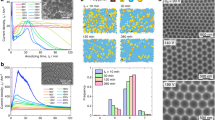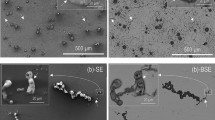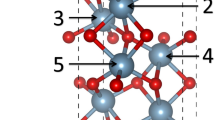Abstract
IT is generally assumed that non-porous oxide films formed on valve metals by anodic oxidation in aqueous electrolytes are normally substantially uniform in thickness and composition. By means of optical and electron microscopy and by preferential chemical dissolution, it has been found that this assumption is definitely incorrect for anodic films formed on aluminium. The non-porous oxide films formed when aluminium is polarized anodically at either constant current or constant voltage in a variety of aqueous electrolytes (for example, borates, carbonates, tartrates and phosphates) at room temperature have a pronounced cell type of structure. A modified form of this cell structure has already been reported in porous aluminium oxide films1.
This is a preview of subscription content, access via your institution
Access options
Subscribe to this journal
Receive 51 print issues and online access
$199.00 per year
only $3.90 per issue
Buy this article
- Purchase on Springer Link
- Instant access to full article PDF
Prices may be subject to local taxes which are calculated during checkout
Similar content being viewed by others
References
Keller, F., Hunter, M. S., and Robinson, D. L., J. Electrochem. Soc., 100, 411 (1953).
Altenpohl, D., Convention Record of I.R.E. 1954 National Convention, Part 3, p. 35.
Author information
Authors and Affiliations
Rights and permissions
About this article
Cite this article
FRANKLIN, R. Structure of Non-porous Anodic Films on Aluminium. Nature 180, 1470–1471 (1957). https://doi.org/10.1038/1801470a0
Issue Date:
DOI: https://doi.org/10.1038/1801470a0
This article is cited by
Comments
By submitting a comment you agree to abide by our Terms and Community Guidelines. If you find something abusive or that does not comply with our terms or guidelines please flag it as inappropriate.



